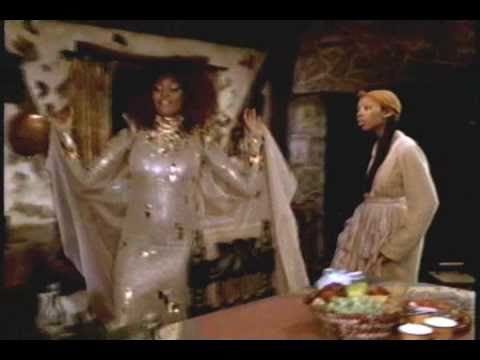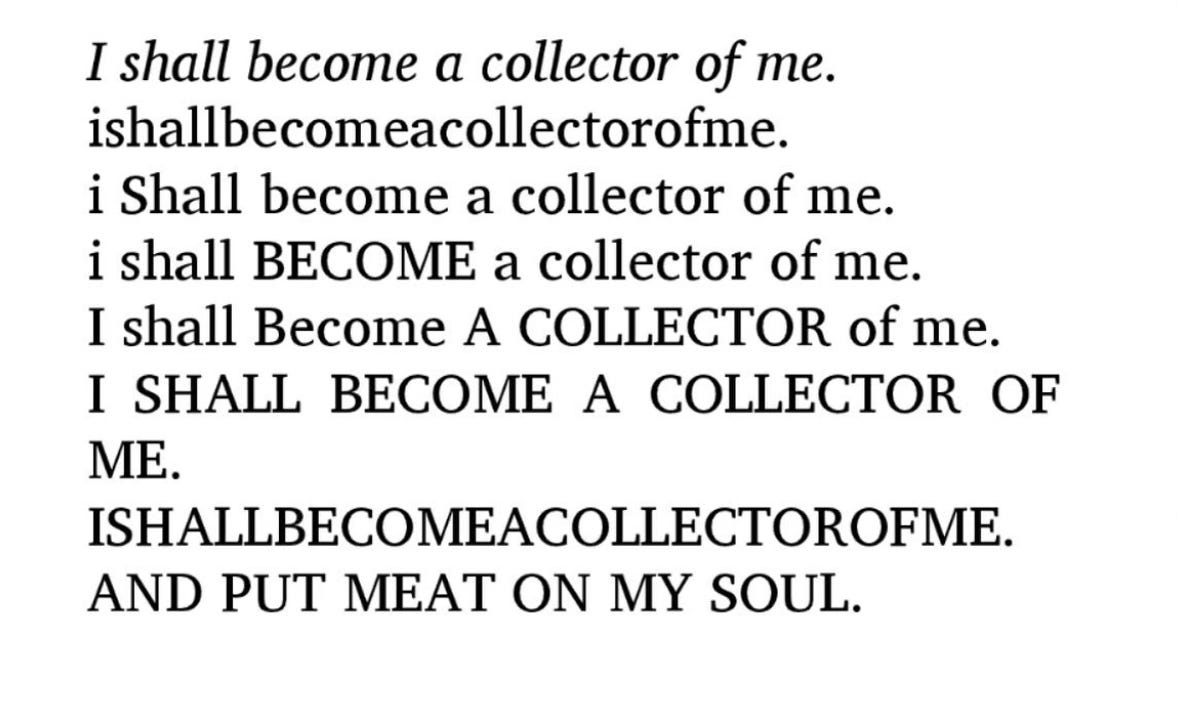💌 Syllabi as Citational Love Letters
Where I’ve been & where I’m going: Introducing the way my public practice is changing
Originally Written on Thursday, January 9th, 2025 @ 10:00 p.m. & continually revised up until today
I have poems inside of me that have been stirring & desiring to be put on the page. This is a fact that I will no longer look away from. I am a poet. It’s been months since I’ve been away from this space but I knew that I had to create my own clearing so that I may return with greater claity to the questions stirring my mind. Writing the weekly essays I had been writing became no longer sustainable energetically. Furthermore, I was writing essays out of the malleable material of life that really desired to be a poem. Or I had already written a poem & was trying to complete the process of expanding what I thought was the accessibility of the dots I was connecting. What I was really doing was trying to make the work more legible because I had a subconscious fear of my poetry alone being misunderstood & used to amplify messages that don’t align with my values. Finally, tired of doing the mental gymnastics of shapeshifting a poem into an essay I dived into my own clearing—practicing gathering, stillness, & honoring the shifts that wanted to occur.
If I don’t publish long-form essays as a part of my public practice will people take me seriously?
Writers write substantial pieces for the public to engage in. If I don’t publish substantial pieces will my pieces/work be considered content (frivolous, unintentional, lacking critical thinking)?
I am not interested in being understood by everyone.
“I do my work & try not to blunder.” — Toni Cade Bambara
Writing weekly substantial pieces was a way to legitimize, flex, & in some ways tame my wild pen. I can think! I can make cohesive arguments! I can take you with me on this critical thought journey! While these skills are beneficial, this practice protected my heart’s desire to write & publish poetry. This is a desire that I can no longer place on the border because doing so pulls me completely off the page (away from you, away from the public I want to practice in front of, away from this archival publication).
So how will I show up to practice in public while centering my poetry? I all my practice to flow with what comes to me with ease & document it for you all. What comes to me with ease, besides writing, is the gift of gathering. Gathering as an essential method that sustains the vernacular. Gathering as an ancient technology to weave worlds & stories. Gathering as is expressed in the Assemblage framework. The theory of Assemblage—gathering as an essential part of the process to self-proclaim oneself as a subject—a way of being made possible only through the vernacular. I can connect dots that seem to have no association to curate a patchwork of exploration. From one root stems a million branches. Moreover, I essentially got a degree in critical theory & know what it’s like to be in spaces where it is never embodied or transformed into praxis. Maybe I don’t have to contort & fight myself in order to continue practicing in public.
“Let me begin by saying that I came to theory because I was hurting-the pain within me was so intense that I could not go on living. I came to theory desperate, wanting to comprehend-to grasp what was happening around and within me. Most importantly, I wanted to make the hurt go away” (bell hooks, Theory as Liberatory Practice).
A majority of my writing practice, of how I spend my time in general, is spent being present enough to create a clearing to understand the embodied knowledge/theory within me. As well as being present enough to be guided in my research process to see a connection that at first seems non-existent. In my exploration of my hurt, pain, grief, & joy I look to the works of folks who have lived before me. The fortification of a research connection is done through the central work of citations. At the bottom of each piece in this publication I have linked Cite Black Women: A Critical Praxis (A Statement) by Christen A. Smith, Erica L. Williams, Imani A. Wadud, Whitney N. L. Pirtle, & The Cite Black Women Collective. This statement affirms what I have felt in academia, fears around my work (including my poetry) being used elsewhere without my permission, & invites folks into a practice of change that can eradicate the harm of erasure.
I will publish mini syllabi that continue to follow this publication’s methodology regarding footnotes, name attribution, & more. Furthermore, my syllabi will disturb forms of knowledge production & where the public traditionally seeks knowledge (typically sources that are soley academic in nature). In the Assemblage: Baby’s Breath syllabi there is no hierarchy in where knowledge is produced & presented nor does it need to be peer-reviewed (especially by folks who are not our peers). I believe an article published in the American Anthropological Association & song lyrics are both forms of knowledge production & theorizing. On page 11 of their statement, the Cite Black Women Collective wrote about the power of their transformational title statement.
“Cite Black Women is more than just a catchphrase or a hashtag: it is an emphatic statement, a command, a rebuke, a call to action, a celebration, an act of rebellion, an ethos, and an act of love. Behind it lies this critical question: What does it look like to dismantle the patriarchal, white supremacist, heterosexist, imperialist impetus of the neoliberal university (and its accomplices) by centering Black women’s ideas and intellectual contributions?”
“I didn’t come out of nothing & neither did you.” — Kay Brown, Looking Back to Chart the Way Forward
Citation as gratitude
Citation as keeping our loved ones alive
Citation as the creation of sites of memory to keep us alive & dreaming
I’m gathering all that I came from, that made me who I am & who I am becoming, available to you through my citational vernacular art practice. Within my methodology, I introduced my citational vernacular practice called Quilted Syllabai. Originally, these visual syllabi were created using additional sources I gathered that didn’t make it into a published essay. The quilted syllabi were apart of my private practice that I now feel called to make both central & public. Because I am centering my desire to write poetry & honoring that my capacity is very limited to contort poems into essays, I will be making a shift in my public practice.
Examples of previously published mini syllabi can be found below.
“…trust your experience. Know whence you came. If you know whence you came, there is really no limit to where you can go.” — James Baldwin, “My Dungeon Shok: Letter to My Nephew on the One Hundredth Anniversary of Emancipation” from his book The Fire Next Time
Now that I can affirm that the creation of a syllabus is a love letter & guided affirmation on how to sustain ourselves, I feel immense freedom in making the shift to publish curated mini syllabi in this publication. I know that the act of citation is intentional, filled with care, & evidence of critical thinking of the highest regard—the kind that invites others to actively engage & lets source creators know I was thinking of you. These mini syllabi will contain a small select sample of sources from the full quilted syllabi available to access with enrollment into the Assemblage Conservatory’s The Clearing membership. You can enroll in The Clearing membership now & at anytime. While my quilted syllabi already disturb the notion of how an academic syllabus is presented, I am excited to continue disturbing it even more by playing with the wild syllabus forms in the future. To gather more information about accessing the Quilted Syllabi & their accompanying resources through The Clearing click the button below.
The Assemblage Conservatory website in & of itself is a beautiful citational letter so be sure to click around. This change in my public practice & the access to the Quilted Syllabi has been updated in this publication’s methodology reflecting the new purchase process for the quilted syllabi.
Additionally, I will continue my public practice of letter writing which you can learn more about here. Moreover, I will write & record my poetry out loud as well as introduce new ways for you all to engage with my poetry to make it the center of my practice (more on that soon). Of course, this shift doesn’t mean you will never receive another essay from me again, after all this is an essay, it just won’t be weekly. Instead of a weekly essay, you may receive a poem, letter, mini-syllabus, or a combination of these forms. This shift simply means that in this moment, I have poems within me that are demanding me to trust that the message is the poem itself. I must trust that the poem is the message & the art of gathering will gather myself and others.
I will leave you with this beautiful citational speech from actress Danielle Deadwyler sharing a survival guide for Black Women in Hollywood. I would love to offer an extension of the title & say that it serves as a survival guide for Black Women everywhere. Danielle is a former educator, having taught 4th grade, 5th grade, arts education, GED studies, ESL, & she has a master’s degree in poetry. Danielle’s background makes me wonder what a future where more people practice their work through the embodiment of a poet would look like. I can only imagine through my dreams that it would be safer, more considerate, community-focused, & all around magical.
P.S. I also adore this video of Danielle discussing her obsession with literature. Specifically, all of the late great Toni Morrison’s work. In this video, Danielle says that reading Toni’s work “…ruptures your world.” She goes on to expand upon this statement by saying “and then you are radicalized into the Toni world & you start doing things way different then you did before.” You can view this gem here. I’m so grateful for the altar that is Assemblage: Baby’s Breath & excited to be back 🩵.
Please remember if you choose to quote this piece, share this piece, or any piece on this publication to always CITE BLACK WOMEN. Please always include my name (Kay Brown she/her pronouns) and a link to the publication of the Assemblage: Baby’s Breath substack in your sharing practice.
To further support my writing practice, receive additional offerings that connect to my pieces, & be the first to hear about other ways to engage in the theory of Assemblage, please consider becoming a paid subscriber.
Lastly, remember that referrals are now available! This means you get to speak the name Assemblage: Baby’s Breath out loud to your community while receiving unique grounded gathered gifts from me. Thank you for being here 💙.









Yay! Welcome back!